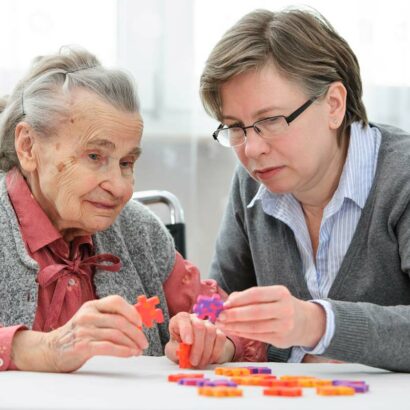Dementia can directly cause challenging behaviour. However, confusion, delusions, and hallucinations are not the only causes of distress. Pain, boredom, or an uncomfortable sitting position can all cause agitation, especially in people who are unable to communicate their discomfort. It’s important to manage the underlying cause of the issue, not just the behaviour you are seeing.
Look at the reason why that behaviour may be happening.
Challenging behaviour is usually a reaction to a set of circumstances, expressing something that the person may be otherwise unable to convey. The natural response to all these challenges is frustration, defensiveness, anger, anxiety, or fear. We all act in certain ways when we’re feeling uneasy, insecure or frustrated. These are magnified in someone with dementia, who is even less equipped to deal. There’s no single right way to respond to most situations, it will depend on the individual and the circumstances. Taking a more gentle, more loving adaptable approach will work better than harsh words and force. Although you can’t always stop an irritating behaviour, you often can make it less annoying or safer, and even over time make it less frequent.
Ways to deal with challenging behaviour
1. Reassure the person
Putting the person first in your thinking, as to how you react is critical. You may have realised that the person with dementia is not going to change, but how you react to a situation may need to. Reassurance reduces anxiety and lets them know you are taking them seriously. In order to be effective, you need to keep your emotions in check which can be incredibly difficult. Whatever you try it may not work at first but make sure you are in a positive frame of mind to give it a go. Be calm in your manner and avoid confrontational phrases such as ‘Calm down’ or ‘Don’t do that’. It may feel dismissive, rather than reassuring. A person with dementia probably can’t articulate what is wrong, so avoid asking this direct question as it may leave them feeling more helpless. Adopt a reassuring tone, ‘I’m here, is everything’s all right?’. Good body language such as smiling and good eye contact will also help.
2. Consider the possible causes
Difficult behaviour is rarely done on purpose. It is usually a combination of several factors that affect behaviour. Try to understand why they are frustrated.
- Consider the timing. Is this a change that’s come on over recent hours or perhaps the last few days?
- Ask yourself if there’s a pattern to when or where the problem seems to happen. Is there something about the light, noise, or activity at that time?
- Have they forgotten to eat or drink resulting in hunger or dehydration?
- Are they wearing too many or too few clothes?
- Are they bored and frustrated as they want to stay busy, or the opposite and overstimulated by too many people around them?
- Are they in pain and have a new infection?
- Have they recently changed their medication?
3. Remove any triggers
Keeping a diary for 1 to 2 weeks can help identify these triggers.
If the change in behaviour comes on suddenly, the cause may be a health problem. The person may be in pain or discomfort from constipation or infection. These may be visual, activity-based or frustration triggers. My father on seeing his keys or going into the garage was reminded that he no longer was driving, which set off a deep frustration about his lack of independence. It may be at mealtimes they feel they should be doing something, as they always used to be cooking. Could you give them another task at this time? It may be as simple as they are uncomfortable in clothes that no longer fit or are difficult to unzip easily.
4. Redirect their attention
Can you give them a choice of things to do or introduce a new activity? Activities such as music or dancing fill people with positive thoughts and give a person confidence. See our article on activity ideas for the elderly and those with dementia.
Repeating the same question or activity may be a result of memory loss where the person cannot remember what they’ve said or done.
- be tactful and patient.
- help the person find the answer themselves.
- look for any underlying theme, such as the person believing they’re lost, and offer reassurance.
- encourage someone to talk about something they like talking about, for example, a period of time or an event they enjoyed
People with dementia often develop restless behaviours, such as pacing up and down, wandering out of the home and agitated fidgeting.
- make sure the person has plenty to eat and drink.
- have a daily routine, including daily walks.
- give them something to occupy their hands if they fidget a lot, such as worry beads or a box of items from the past.
Sleep disturbance. Dementia can cause problems with the person’s body clock, or sleep-wake cycle. A person with dementia may get up repeatedly during the night, unaware that it’s nighttime.
- provide plenty of activity and exposure to daylight.
- make sure the bedroom is comfortable and provide a nightlight or blackout blinds if needed.
- cut down on caffeine and alcohol in the evening.
Following a partner or carer around Dementia makes people feel insecure and anxious. They may need constant reassurance they’re not alone and they’re safe. They may also ask for people who died many years ago, or ask to go home without realising they’re in their own home.
- When you are doing jobs such as ironing or cooking can they be with you?
- Reassure them that they’re safe and secure if they’re asking to go home.



